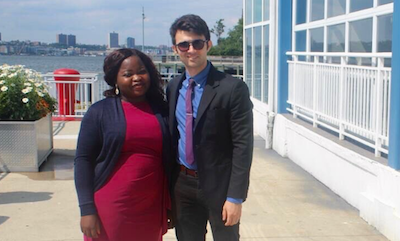In Malawi, Finding Ways to Improve Health.

Recently at Kamuzu Central, a tertiary care hospital in Malawi’s capital of Lilongwe, a patient died because she couldn’t get a blood transfusion. “They ran out of transfusion kits,” says Vadim Kogan (SPH’15). “She had her family there, ready to give blood, and they couldn’t do it.”
Kogan is a Global Health Corps fellow working with the Malawian Ministry of Health in the brand-new quality management department. Before arriving in Malawi, the second-poorest country in the world by per capita income, he says he expected the main issue would be funding: “There are definitely limited resources, but we’re seeing that when people have bad health outcomes it’s very much to do with organizational, structural problems.”
Hospitals—even Kamuzu, in the capital—run out of supplies and medicines, “but that money is allocated,” Kogan says. “It’s an issue with the supply chain.” Why doesn’t the hospital fix how it brings in supplies? “Here at Kamuzu they don’t have the time to talk to each other and figure out what’s going on, because there are too many patients coming through the door.” Why are so many people coming to a tertiary hospital, set up for specialized surgeries and some of the most advanced procedures in the country, for basic care? “People are avoiding the local clinics and the district hospitals,” Kogan says, “partly because some are only open 9 to 5, which is an issue with HR and accountability.”
That, he says, is why the country is excited about its new quality improvement effort, which began least year: “The hope is that this quality department will make things better without spending any more money.”
Kogan arrived in Malawi in August for his 13-month fellowship, just in time to help finish crafting the policy that defines the role of the Ministry of Health’s quality management director, and what quality management efforts are in store through 2030.![]()
His focus is the creation of an HIV quality of care roadmap for the country through 2030. He says Malawi is actually doing better than the US in getting on track to meet the United Nations’ 90-90-90 goals (where 90 percent of people living with HIV will be diagnosed, 90 percent of those diagnosed will be receiving treatment, and 90 percent of those in treatment will have their viral load reduced to undetectable levels, by 2020). He is also working on a World Bank funding proposal for a maternal and child health quality improvement program.
Kogan is one of 20 Global Health Corps fellows in Malawi. Global Health Corps places adults under 30 years old from a variety of fields in high-impact health organizations around the world, focusing on how structural injustice creates health inequities. After training in the US, the fellows work in pairs, Kogan says, with one fellow in the pair coming from the country where they are working. Kogan is paired with Evelyn Sumani, a Malawian education officer who works on health and socioeconomic issues in her country. “That system was one of the reasons I was really excited about the program,” Kogan says. “It wasn’t just like, ‘Let’s find a local to help the American get used to the country.’ You’re working together, and you both have the skill set.”
The idea, Kogan says, is to build a community of young public health professionals from around the world, who will not only benefit from training and fellowship experience, but also maintain their connections. “Some of us will become ministers of health or members of parliament,” he says, as well as global health workers. “We’ll know each other and have worked with each other, and they’re hoping this creates an initiative for change and reform and development that is better and faster than what’s happening now.”
Kogan’s previous experience lines up particularly well for helping shape the new quality improvement program. “My entire public health work history has been in a new department or a new program or a new grant that didn’t exist before,” he says. His practicum was helping create a curriculum for a new grassroots activism training institute at the Zero TB Deaths Program at Harvard Medical School. After completing his MPH, he helped create an HIV training program for Boston HIV case managers at the Boston Public Health Commission. He had just landed in his current position at the Community Research Initiative of New England, coordinating the newly developed Tuberculosis Drug Assistance Program (TB DAP), when he found out he had been accepted for a fellowship with the Global Health Corps.
Kogan says he is hopeful about what the quality management department will be able to accomplish in Malawi. The country makes health a priority in its limited budget, and Kogan says health coverage is relatively high. “The health workers themselves are doing an amazing job,” he says. “They’re each doing the work of 10 people.”
Aid is actually the area where he is most worried. Kogan says whether the quality improvement policy he is helping craft will go into use and be effective depends on whether the Trump administration and Congress cut the US’s foreign aid, as has been threatened. Much of Malawi’s $500 million health budget comes from foreign aid, and in HIV care and prevention, Kogan says, the budget is 95 percent foreign aid, mostly from the US President’s Emergency Plan for AIDS Relief (PEPFAR). “It’s nerve-wracking,” he says.
“I didn’t think US development funding would be as impactful in countries like Malawi as it is,” he says. “I’m thinking a lot more about the impact of our policy on the most vulnerable, both domestically and abroad. I was already concerned, but now I’m really concerned.” Stretched by quality improvement, Kogan says, that aid can do so much.